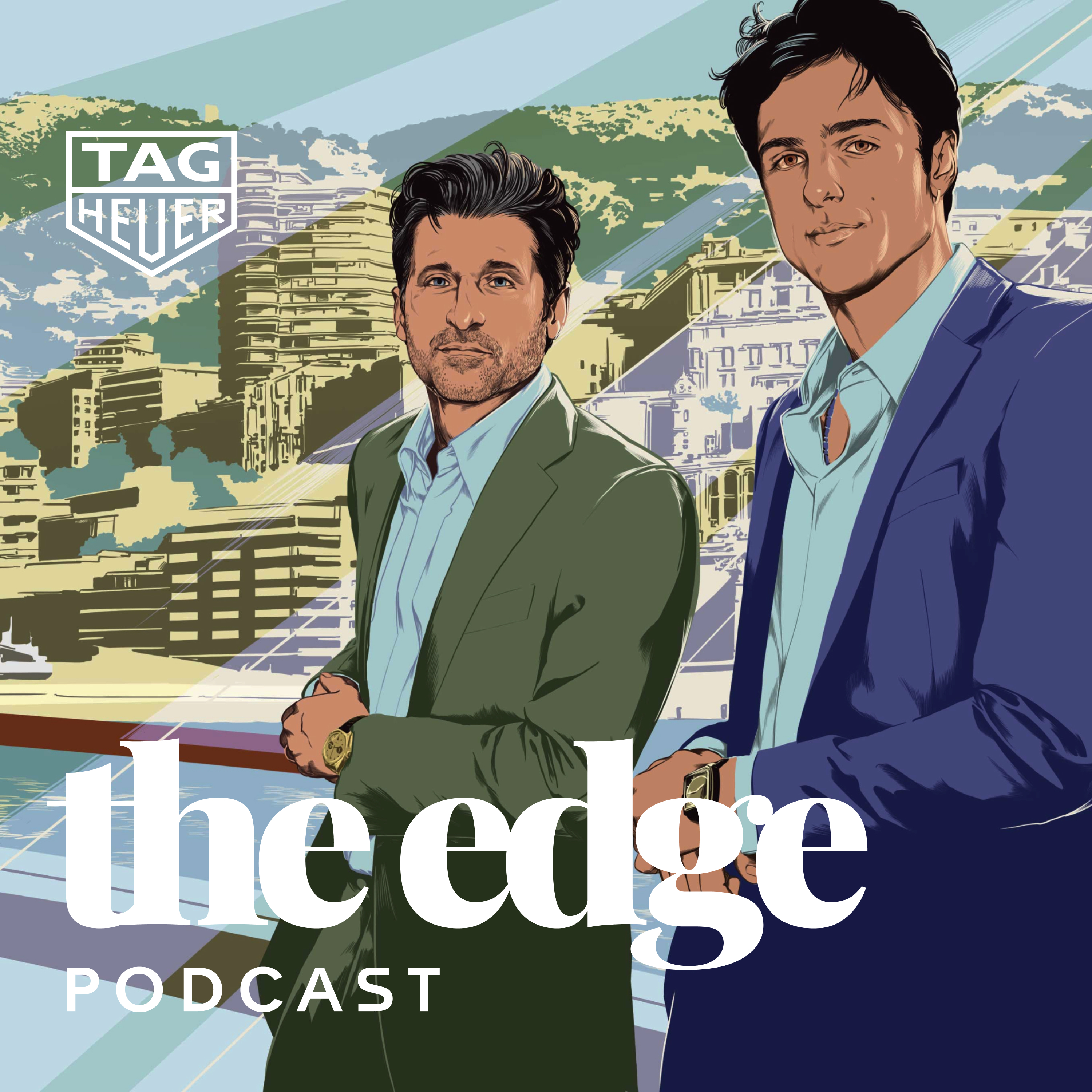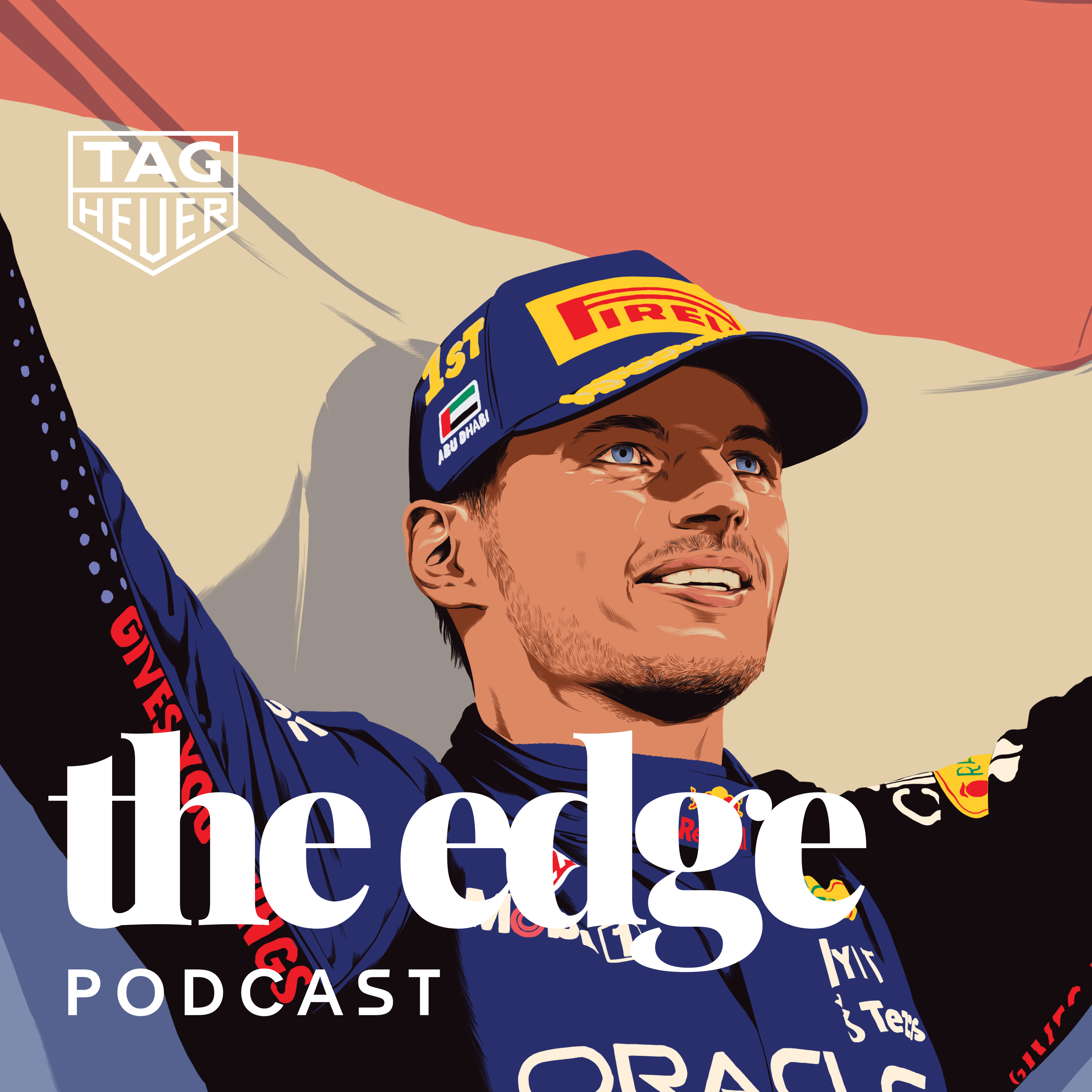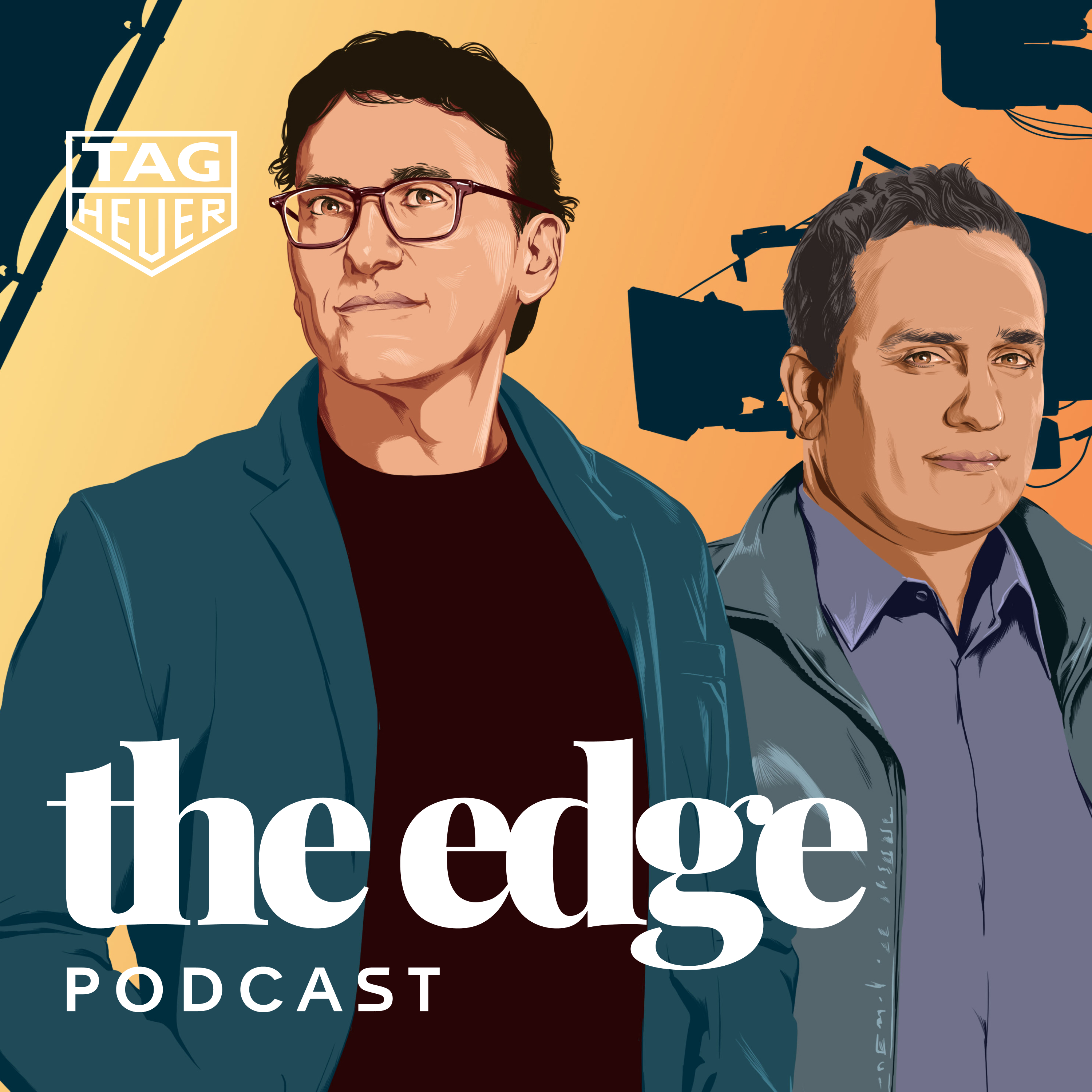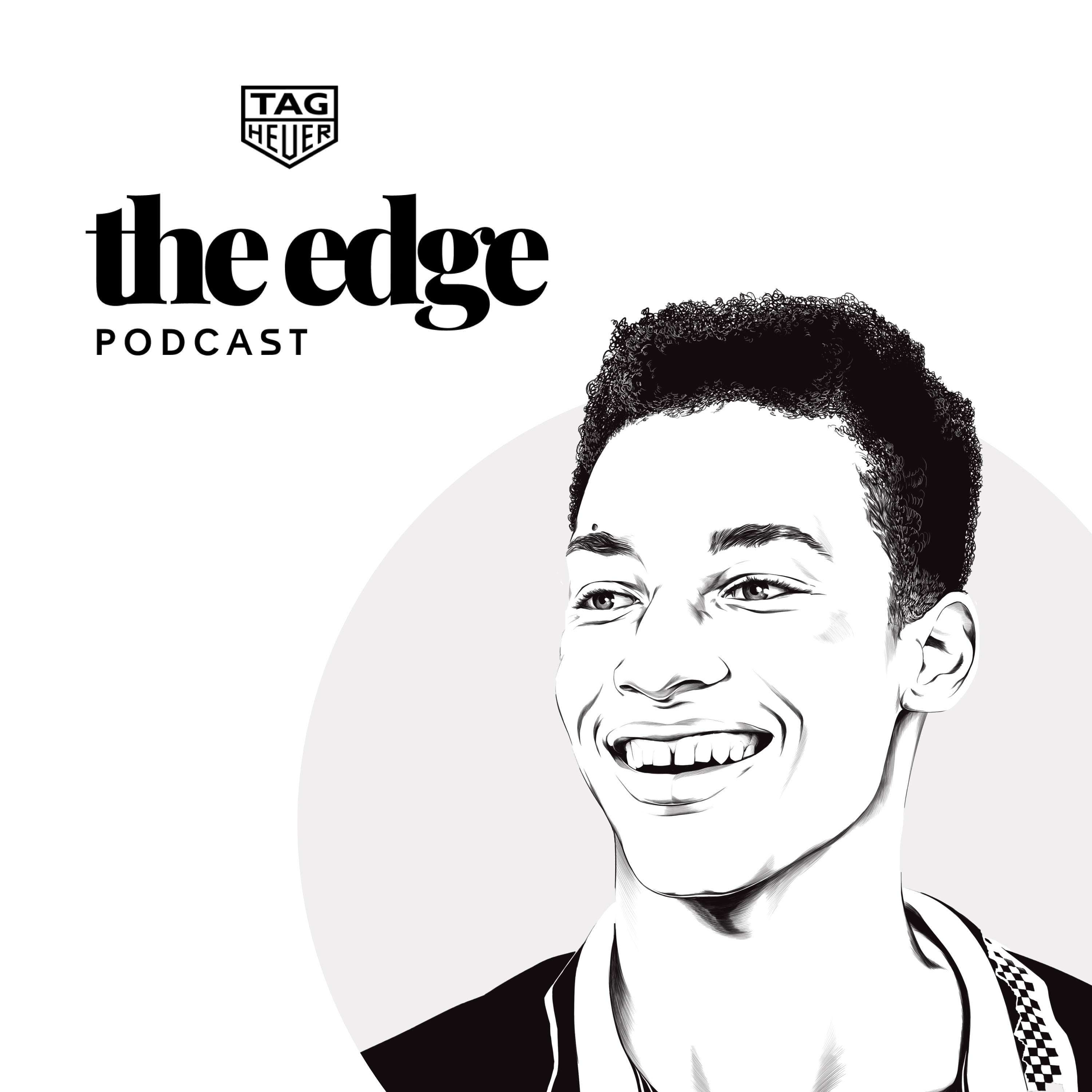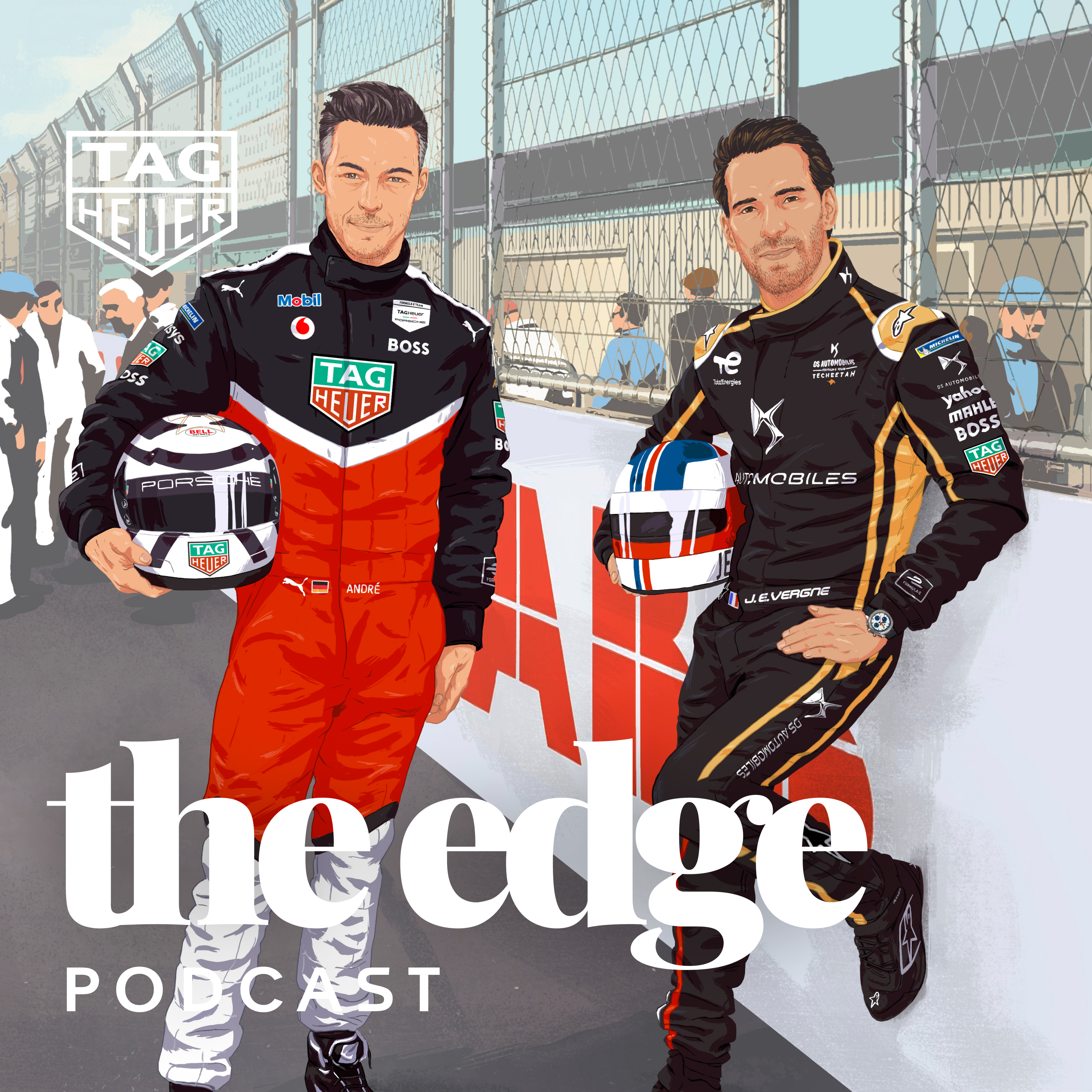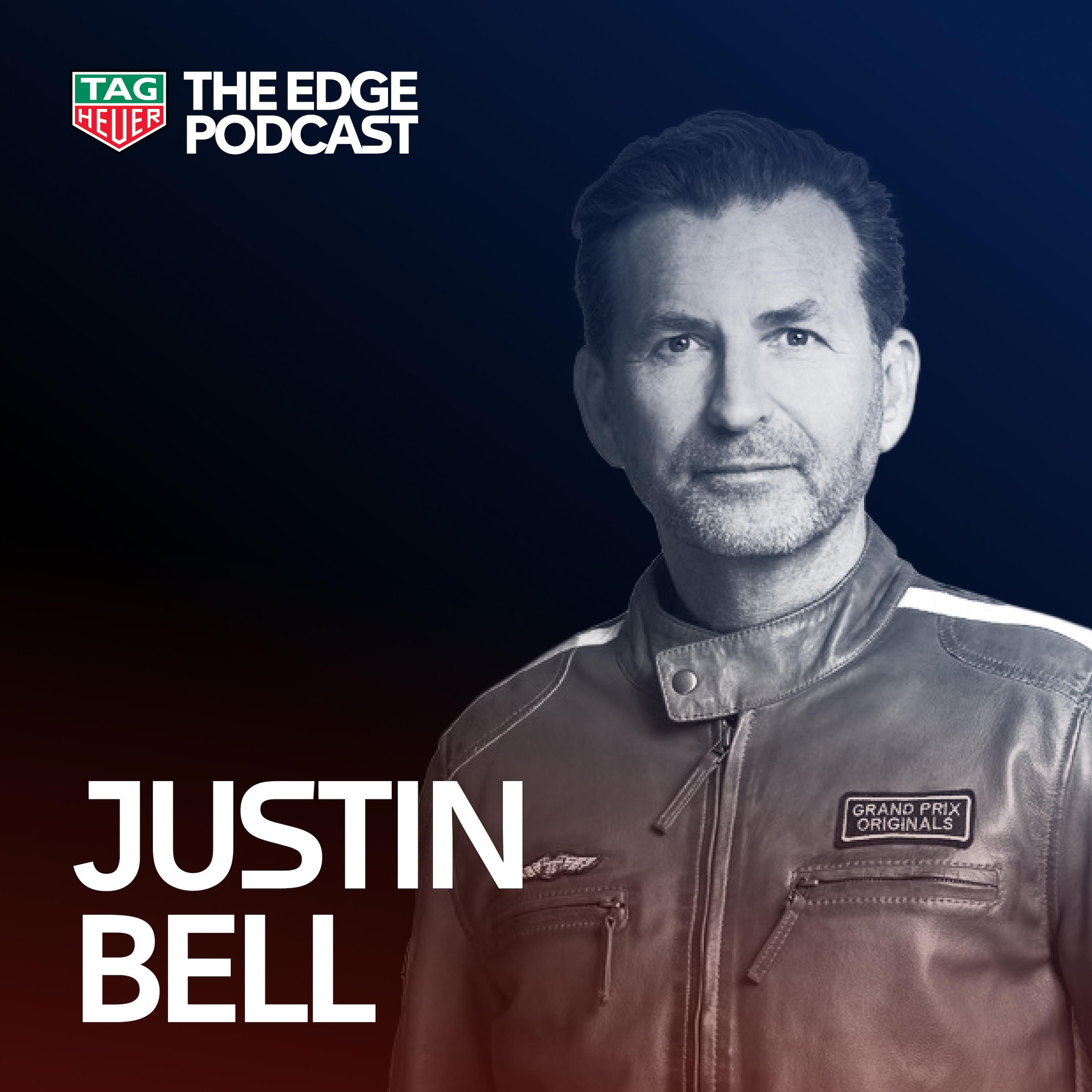Episode Transcript
Speaker 1 00:00:02 Who's to say how far euphoria star Jacob L D will go. The 24 year old Australian actor is already one of the standout talents of his generation. His roles are carefully chosen, they're complex and nuanced, but while these roles are difficult to play, they're even harder to shake. How do you detach yourself from performance to explore other characters or roles? How do you stay true to yourself? How do you consistently choose the right parts? These are questions that actor Patrick Dempsey understands. Well. He uses all of his experience, know how to play the iconic roles. We all remember him for. There's a sweet resemblance between Jacob and Patrick that pushed me to interview them together. They're both big fans of motor sport. In fact, Patrick is also a racing driver, so we found the perfect setting to record this podcast. The 2022 Monaco grand Prix. I wanted to go back to the beginning to understand the moment when they fell in love with cinema and the moment that inspired them to get in front of the camera. I'm your host te van BRCA. This is the edge a podcast by tag Hoya. Let's start with Jacob.
Speaker 2 00:01:18 I think, uh, I think it started at blockbuster video for me. My, uh, mother and father would take us on Fridays cuz they had deals you could get, uh, I think you could get one or two new to weekly, which was a new release DVD and five just regular weekly rentals. So we would go get the Friday deals. And um, if any, we have a, a rating system in Australia, which is G PG M ma and ma is like gore and swearing. And I remember 12, I was allowed to get an ma 15 plus movie. So I just went straight to the horror section and I would get these just awful gory, terribly made films <laugh> and that was sort of when I fell in love with, with movies was the process of having the, uh, DVD and you know, taking it out and putting it in the machine. And
Speaker 1 00:02:07 Is there a specific gory horror film that, that captured your imagination?
Speaker 2 00:02:13 Probably the first one was probably probably evil. Dead, I think. Okay. I remember cuz I thought, oh I could, I could, I could make this cuz I remember I could see the prosthetics and stuff like that. Yeah. Oh I think I could, could do this. You know, none of it was performance based. It was all how shocking could the, could, could it be?
Speaker 1 00:02:31 And I love your first experiences with DVDs as opposed to VHS did you know, don't get me wrong.
Speaker 2 00:02:37 I was born 97 when we had
Speaker 1 00:02:39 VHSs. We had,
Speaker 2 00:02:40 We uh, we had burnt movies under them.
Speaker 1 00:02:42 Right, right.
Speaker 2 00:02:43 I remember that too. Patrick.
Speaker 1 00:02:45 How, how about you
Speaker 3 00:02:46 First moment movie. I remember we, it was right before Thanksgiving break, uh, at school and in the cafeteria, they were going to show great expectation. David Lean's great expectation. Uh, so having to be outta class and I remember just being absorbed by that film and how beautifully it was shot, how dark and scary that film was.
Speaker 1 00:03:08 It is a beautiful film. Yeah. Gorgeous film. Um, and I guess in, in turn, what was it that made you pursue a career in acting let's start with E Patrick.
Speaker 3 00:03:18 Uh it's I, and you know, I was in a oddly enough, I was in a vaudeville troop. I was juggling and doing slaps steak and I was performing and then I, I was invited to do a play and then that's when I, I got the B doing the play at this dinner theater turned 17. I remember, gosh, this would be great if I could do this professionally and then, um, and then things started telling full, but I remember that moment distinctly.
Speaker 1 00:03:45 Did, did you have people telling you, no, you shouldn't do that cuz it's gonna be so hard or was it, did you just kind of think no, I'm just gonna go.
Speaker 3 00:03:52 I, I, I come from a very small town in rural Maine where no one really breaks out of that. Uh, and um, people were like, you might do more dinner theater, you can do some performing with the, the vaudeville troupe probably won't make it. Um, but I, I ended up doing a, a little talent competition with the juggling comedy and uh, an agent saw me and said, you should come to New York, do this talent competition. And I did that raised enough money from the local neighborhood and from the town to fly down to New York and I won and got an agent and that's how all started amazing. So yeah, really? Yeah. It was just meant to be fantastic.
Speaker 1 00:04:30 Yeah. How about you, Jacob? What was your moment that you decided to pursue acting as a career?
Speaker 2 00:04:36 I had, uh, I was going to, I was living in Melbourne in high school and I read, um, Becks waiting for GTA and I obviously didn't understand it at all. Completely
Speaker 1 00:04:47 Upset. Do you send that out? No, I think
Speaker 3 00:04:49 That's no one does
Speaker 1 00:04:50 Point. Right.
Speaker 2 00:04:52 Uh, but I remember feeling a certain way at school and uh, and for some reason reading that play, if something clicked, something changed, uh, and from that point it was just, that was all I knew how to do. And then I did a, a production I Romeo and Juliet and I played Maio and that was the first time that I really, I felt like I had the audience on a string, you know, and I, I, I felt like myself for the first time ever. And, and you know, I felt so alive. And, and from that, from those two moments, it was kind of there wasn't really, I didn't, I didn't know how to do anything else. Like nothing else really brought me joy, nothing else interested me. And, um, and yeah, it's been pretty much, that was 15, 16, 17, I think
Speaker 1 00:05:40 It's so interesting. That idea of feeling yourself for the first time playing another character. What do you think that's about? Do you feel, is there something in that for you too, Patrick? Do you, do you recognize that feeling?
Speaker 3 00:05:53 Mm, it depends on the role sometimes. You're just trying to connect to how you would relate to that to be as natural as well. So it depends on the medium, I think. Mm. Uh, sometimes you get something that just clicks, you know, and it's magical. And then other things you struggle with and they work, but it's not quite the same.
Speaker 2 00:06:16 What, what
Speaker 1 00:06:16 Would you say in that vein then has been for both of you the moment where the role has clicked, the one where you've thought, God, this is, this is exactly where I'm meant to be at this moment. I could fully align with this character.
Speaker 3 00:06:29 God, I don't know if I've ever felt that way. <laugh> yeah. You
Speaker 2 00:06:31 Know, I
Speaker 3 00:06:31 Don't know if I've had that moment.
Speaker 2 00:06:33 Yeah, I think, I mean, yeah. I feel like I'm constantly in doubt and trying to figure it out, trying to figure it out. And then even after it comes out and people maybe accept it and they like it, I'm still not quite sure if it's ever, there's always something that I'm like, ah, I didn't quite, I didn't quite feel that I didn't quite get there, you know?
Speaker 3 00:06:53 Yeah. How do you, can you watch yourself objectively?
Speaker 2 00:06:55 No. Yeah, not even second. And I'm yeah, I wouldn't consider myself like a terribly vain person, but I immediately just start, oh, why is your left eye like that?
Speaker 3 00:07:06 And I'm not just,
Speaker 2 00:07:07 I probably not to be that guy, but it's like, why did you do that with your fingers? You know? And that's not helpful whatsoever.
Speaker 3 00:07:14 I, I
Speaker 2 00:07:14 Hear you on that. I'm I can't critique myself.
Speaker 3 00:07:18 How about watching playback? Can you adjust where you can separate yourself and go, okay, here's what the frame is. This is what I need to do. Maybe how going down that rabbit,
Speaker 2 00:07:24 Technically dissecting. Yeah. In a way in a film from a filmmaking standpoint, I think I can look at it and go, okay, maybe if you stand here or if you drop your head, but even then I start to micromanage and then, you know, I'm not maybe not quite in the moment as, as I'd like to be. Yeah. Can you watch yourself, Patrick?
Speaker 3 00:07:43 Um, I can, when I'm watching playback, I can, uh, adjust and self direct and, and get a better understanding of what the director's going for, what the shot requires. When I watch something for the first time, it's very hard to be objective mm-hmm <affirmative> um, because you can't, you you're seeing all your insecurities and all those things. That's where you're, you're targeting. So it's very hard. So I don't really watch myself. I don't enjoy that part of it. Yeah. I enjoy the doing the doing is the most, um, that's when you have the control, when you're, when you're watching it, there's so many other people that get their hands into the performance. It's very hard.
Speaker 2 00:08:20 Yeah. I imagine, I imagine too, like if you were to watch yourself, that would be all your time. You've done so much work, you know, it's a, and it's this crazy thing of you spend, you know, a year making something or making things and then you'd have to spend the same amount of time watching it back. You'd constantly be in this cycle of just watching you. It would just be awful, you know, you do it and then you rewatch yourself doing it. It's like me, me, me, me, me that's bucket play. Yeah. Yeah.
Speaker 3 00:08:48 He knew who Jimmy Stewart said he never watched any of his performances. Really? Yes that's. So I found fascinating.
Speaker 1 00:08:54 You've kind of imagine he'd be someone who would, cause it's such a, a specific manner that he has that feels quite valid. He
Speaker 3 00:09:00 Has, you know, had that sort of stutter and you know, his, his sort of rhythm that was his and his alone. But I, I was really surprised by that. And then, uh, the more experience I had, the, the more I understood, like, oh yeah, now I understand why he doesn't wanna watch it. Mm-hmm
Speaker 2 00:09:14 <affirmative> how
Speaker 1 00:09:15 Do you guys feel about reviews?
Speaker 3 00:09:17 Uh, depends on the reviewer. I think if you have someone, um, who gets it, it's good. And then sometimes it's a personal attack or, or not, but sometimes you can be very constructive and I think it you're like, yeah, you're not you're right. So I don't really read a lot of
Speaker 2 00:09:32 Them and yeah, no, I think now there's an inundation of just everybody's opinion all at once. Um, you know, I don't think, yeah, I, I, I follow this thing recently that I heard and it might sound a little arrogant, but, uh, I was really bad at reading the internet for, for the start of my career, which is now I guess, and I was terrible. I was reading everything and it was, it's never gonna be kind very rarely. They're like, wow, that was wonderful. You're you know what I mean? They pick it apart. And um, somebody said, uh, why would you concern yourself with the opinion of somebody who's not a professional, uh, in the field. So now I've sort of made the circle smaller of if I respect the work that this person puts in, then I'll respect the opinion and, and take it on board. Otherwise it's just too, too much. And, uh, you know,
Speaker 3 00:10:27 You hold onto the negative, but you don't hang onto the positive, you know, that's the one that sort of, it hits your insecurity if you're not careful
Speaker 1 00:10:33 And that's the kind of universal truth, right. And it's just writ large for you guys, cuz it's kind of on every platform and you can read it wherever you go online or on Instagram, whatever. Um, I, I, we interview a lot of, I interview a lot of sports people for this podcast and I find it really interesting cause often they're people that operate on their own a little bit like actors do, I guess you're part of a team when you're in a play or, but you, you are in your own zone creating your character. Do you feel like the key to success is constant self criticism because these sports people it's like, they find that one moment, like you were saying Jacob, where it's like, I could have jumped that hurdle a little bit more cleanly or I could have taken that lap a little bit faster. Do you feel like being on yourself the whole time is the only way to achieve that or is being kind to yourself? Part of, part of it too?
Speaker 2 00:11:20 Yeah. I, I quite enjoy being, uh, highly critical of myself. I think it, um, right now it, it makes me demand a, a certain quality of work, but that's, it's kind of like my own meter and I have to, I have this level in myself that I have to reach or surpass. And I think that that to me keep driven to the wrong word, but it, it, it keeps me interested in the work and, and I feel like if I'm asking people to watch, to take the time outta their day to watch my work, then I better give a, a certain level of truth or, you know, a dedication and time to the stuff that I'm putting on the screen. Um, I'm not sure if that really answers the question, but for me it's personal, you know? Um,
Speaker 1 00:12:05 How about you, Patrick?
Speaker 3 00:12:06 Yeah, I think it's a constant evolution where you're, you know, what you're strength seeing your weaknesses are and you try to improve each time. You have a project to your weaknesses to go into that, working on that a little bit more and refining it. Um, and just really focusing on the process I think, and, and, and, and being more fully immersed into that. I think that helps, but other, everything else becomes too much of a distraction.
Speaker 1 00:12:46 I'd like to talk now a little bit about the first time you both started acting. So the first performance, if you will, that you kind of gave, um, it could be the first one from school, the first one from drama school, the first one of your kind of professional career, um, Jacob, let's start with you. What was your first acting performance? How old were you, where was it set scene?
Speaker 2 00:13:07 I think I was, I think I might have been 12 or 13 and I was, I played the cat in the hat in iCal musical. Um, which I think to this day stands as one of my better, one of my better performances really though, really it was completely uninhibited and free. This teacher, I was a little bit rambunctious and, um, she was like, you have to play the cat in iCal. And I was like, absolutely not. <laugh>. Um, and then my mom kind of pushed me to do it and I was singing and dancing involved, which now I would turn into a small ball and hide from yeah. Terrifying. Um, but I just was part of it was like, okay, great. And, um, I don't think I've ever felt free at performing than, than you know, that, that performance.
Speaker 1 00:13:59 So would you never do a kind of row Goling in LA LA landed?
Speaker 2 00:14:03 Oh, I'd love to, I'd love to, but it would be, it would be a massive challenge beyond anything that I can imagine. <laugh>.
Speaker 1 00:14:12 Um, can you describe how you felt before that performance and, you know, when you, with that first instance, how did you kind of psych yourself up for it? How did you get in the zone or did you just, was it very instinctive?
Speaker 2 00:14:23 You know, I wasn't, I wasn't nervous at all. Um, I had so much, we will call Itza, um, <laugh> arrogance. I had so much arrogance at that age. Um, I was indestructible and, um, I was I'm so well rehearsed and so ready and so sure of myself, um, that I really, I was really just, uh, I, I think I was, you know, in my head I was smoking cigarettes, drinking whiskey in the room, getting ready for the performance. Like, ah, here we go again another night guys. And we, I think we did two performances, you know, but in my head I was this great theater veteran
Speaker 1 00:15:03 <laugh> you know, it
Speaker 2 00:15:04 Was brilliant. Yeah. It was interesting.
Speaker 1 00:15:07 Um, do you, do you make it sound as though I obviously you are not arrogant, you don't come across as arrogant at all, but it makes you, you make it sound as though you've kind of moved beyond that feeling, but surely doing what you do now in Hollywood, you have to have a certain level of self belief to, to do it, to get up and get on those sets, to be on the set with Zera or whatever. There has to be a certain level surely
Speaker 2 00:15:30 Still. Yeah. Um, I think the more public that my work has gotten more unsure of that I've become, but I think, yeah, I think it'd be, or MIS me to say, there's not this, uh, pit somewhere in my stomach. That's deeply, deeply confident in the work that I do. Um, I, I think, you know, to, to stand in front of people and put yourself out there, you have to have some form of enormous ego somewhere. Um, but, uh, it's much less present now. I think in my personality, I'm, I'm much more worried person, but I think in my bones, I'm sure I must have some kind of confidence to keep, uh, to keep showing up and thinking that <laugh>, I'm the guy to, to, to, to, to, you know, to stand in front of a camera.
Speaker 1 00:16:17 Do you remember, um, specifically how you felt after your performance in S or musicals? Was there
Speaker 2 00:16:23 A electric? Really? Yeah. I could walk on water after that. I'm pretty sure I'd um, in my head I'm just kicking the door to my house open and, you know, clicking up my mom to make me do that. <laugh>
Speaker 1 00:16:36 When I was on top of the world. Were you the kind of kid that performed a lot, like family events and that kind of thing,
Speaker 2 00:16:42 Right? Yeah. It was terribly obnoxious. Did you have like a routine or something? Um, I used to <laugh> I did. I used to, I used to pretend I was in a Jack, the ripper musical, and I would walk around the house singing songs about, uh, being Jack the ripper and murdering people and getting away with it. I'm not sure why, but my mom has videos of it. <laugh>
Speaker 1 00:17:03 I reckon it might have something to do with the horror films you were watching. Maybe <laugh> maybe,
Speaker 2 00:17:07 Maybe.
Speaker 1 00:17:08 Yeah. Fantastic. Thank you, Jacob. Um, Patrick mm-hmm, <affirmative> your turn? What was your first formative performance? Would you say, tell us a bit, well,
Speaker 3 00:17:17 There were two. I was trying to think, I think it's funny. You were doing the musical. I, I had, I did this summer theater camp in Northern Maine and we, it was an original production musical, and I was playing the hook to a rabbit and I had to sing and dance and do all that. And I just remember being part of the, the group and it was a lot of fun. I enjoyed the total immersion in the summer where you're just, uh, waking up in the morning, dancing, singing, working on the, the plays and musicals and things like that. That was really fun. Are you, and that's where the bug really hit, I
Speaker 2 00:17:51 Think.
Speaker 1 00:17:51 Right. Are you into the kind of dancing and singing thing, would you do
Speaker 3 00:17:54 Not anymore? No. I mean, I just finished up this musical, you know, disenchanted, which is this sequel to enchanted and we spent months doing this musical number and dance number and then they cut the movie together and they're like, okay, we're not gonna use it now. <laugh> I can say it doesn't advance this story. Oh, so it was fun to do. I really enjoyed the process, loved working with the dancers and it would be something they'd like to do in the future on stage. I'm not sure I have the chops to do it. That takes.
Speaker 2 00:18:21 Yeah.
Speaker 3 00:18:22 Oh yeah. I really admire them a lot more. Um, now, after having that experience, but, uh, I would like to in the future, the singing was really quite something. The vibration and the high you get from the singing yeah. Is really cool.
Speaker 2 00:18:34 I've heard, I, I don't sing, but I've heard that in terms of performance, it like unlocks this, another form of expression. You, you find yourself expressing things that you didn't even know you had inside you
Speaker 3 00:18:46 And you work with a singing coach and you hit these notes and the vibration, and then the emotion comes through that. And the process of the recording and working on the song was something I really enjoyed amazing much more than I expected because I'm not a singer. Yeah. But I, I ended up, you know, with great support, finding a voice. And I really enjoyed that process.
Speaker 1 00:19:03 Do you remember the moment where you had kind of the worst stage fright that you've ever had? And if so, what was it?
Speaker 3 00:19:10 I don't think it ever goes away. I think it's always there. You just learn how to manage it. You know, you start to develop a technique to, to be aware of it and then to allow that, to fuel you. Um, I think it gets worse. The older, you get, to be honest with you, I think because there's more expectation, which means you have to put more time in your preparation so that you can go in and be completely confident when you step on set and you can be private publicly. Um, and I think that gets increasingly harder. The more people become aware of you. Uh, and then you wanna push yourself. Uh, it's good when you feel that way, because then you're working harder and you're also, once the camera is rolling, you're really present.
Speaker 2 00:19:50 Right.
Speaker 3 00:19:51 Which is the key.
Speaker 2 00:19:52 Yeah. Private publicly. I like that a lot. How's interesting.
Speaker 1 00:19:55 How about you with the kind of stagefright thing, have you, there been a moment where it's been kind of so overwhelming, you haven't been able to do it or,
Speaker 2 00:20:03 I mean, it's all the time, like you said, and I think it's, it's getting, it's getting worse. Um, because like you said, there's an expectation, uh, of yourself and then of, of the performance. Um, the, the, to give a, like a, a memory, uh, I was doing Midsummer night stream and I was playing Obon and this was this, I learned a really strong lesson. Uh, I think I was 17.
Speaker 3 00:20:28 Um,
Speaker 2 00:20:29 And I hadn't prepared and it was cuz it was sort of, it was the first time in my life that I didn't prepare, it was a summer. And I think I wanted to go on a trip with a girlfriend or something. Um, and I was not prepared and we ended up having to act so much of the dialogue and I was standing on the side of the stage and it was that moment of, I have no idea what any of the words are at all. And it's that feeling? I don't know if you don't, if you've never had it it's you could really throw yourself a building. I could vanish, just take me away, take my, take, make me disappear. I never wanna see anything. I'll Walden. I'll go by a pond and I'll stay there and I'll never do any, uh, terrifying, terrifying. And then I think someone walked past and was literal, just like, just forget about it. It'll be fine. And uh, and then it was my cue and I moved onto the stage, like a snake. And remember the, remember the lines they came, which was lucky. But I genuinely thought at that moment I didn't have them. And, and I really believe that was from like a preparation. And from that day I've ne my greatest fear. I go back to that moment of is not knowing, not just my lines, but knowing what I'm trying to get across, knowing what I'm trying to say. Um, so I learned, I learned a pretty valuable lesson that day. You know,
Speaker 3 00:21:46 I have a great story of what happened to me. I, what I, I was doing Brighton beach memoirs on the road. We were doing out of town tryouts. And I think we were in, uh, somewhere, um, Yale, you know, we were, we were, I was about step on stage and genes, who was the director, Neil
Speaker 3 00:22:05 Neil was in the audience. And I, there's a moment where you have this monologue where Eugene is talking. Uh, he is reading a letter and I get out there and I, and I see the director in the audience genes and, and I go up and I have no idea what to say next. And thank God the actress on stage reads the letter. So I just slowly keep my blocking going. And I move. And by the time I get to the other stage, it came back to me by, oh my goodness, Neil Simon. I go up with his beautiful lines and the director. And I was like, my biggest, it's like the actor's worst nightmare,
Speaker 2 00:22:37 Absolutely terrible.
Speaker 3 00:22:38 That was very early on in my career.
Speaker 2 00:22:40 Wow. So it's important to have those lessons early. Yeah.
Speaker 3 00:22:42 It gets back to
Speaker 2 00:22:43 Preparation, but that happens. And then, and yeah, it's prepara, it's especially live theater. It's really like, yeah. Yeah. But I think preparation becomes life or death. It's like to not be prepared to me is that's like that, that dream where you go to school and you've got, you forgot your pants. Right. It's that feeling? You know, it's
Speaker 3 00:23:02 But it's like the athletes, you know, you know, they, they keep practicing over and over again or you at a driving range or whatever it is. See time in a car it's like the same for being an actor. You know, it's just, you really have to commit to doing it. So you have that muscle memory so that it just instinctually will come through.
Speaker 2 00:23:17 Someone said this to the other day, Olympians, you know, you train four years for one performance. And to me it should be the same thing for a film or a play. It's like you're training every single day, every single moment of everything that you're taking in for that, for that performance, you know, but it is it's muscle memory. It gets in your blood. And if you do it enough, it's, I think it's impossible to forget your lines. It's impossible to forget what you're doing up there. You know, it becomes part of your DNA.
Speaker 1 00:23:50 You're both at very different parts of your careers, different stages. You are very early on Jacob and Patrick you've achieved a lot. Uh you've you've achieved a great deal. You are also a racing car driver. Uh, you've done you've written for stage and screen as well or
Speaker 3 00:24:04 No, I haven't. But did you, I've directed some things, some short things. Yes.
Speaker 1 00:24:07 Um, I'd love to know what you both feel you want to accomplish moving forward. What's the next big goal. Jacob will start with you.
Speaker 2 00:24:15 I wanna drive cars. Well, there you go.
Speaker 3 00:24:17 Yeah. I
Speaker 2 00:24:17 Mean, that's the right place for that. That's like, that's like old Hollywood legend. Do you know what I mean? They, these guys were driving cars, Steve McQueen, you know, it's just, it's, that's, that's exciting to me that you do that. That's so that's so, so cool. Michael fast bender drives cars, you know, it seems synonymous Paul Newman hunting, Paul Newman, you know? Yeah.
Speaker 3 00:24:36 Dan burn. Yeah. It's interesting with the
Speaker 2 00:24:39 Patrick Dempsey,
Speaker 3 00:24:40 It's fun to be a part of that, you know, that, that group of, you know, and you see Michael coming along now. So it's, it's, it's funny. It's just, I, I think it has a lot to do with the teamwork and also how it cleans the mind. You don't think about anything you're just really present. Um, and it's, it's a great meditation in many ways. Is
Speaker 2 00:24:58 It a thrill to you at all? Is there any rush or is it just,
Speaker 3 00:25:01 There's a rush before you get in the car? You know, it's the same thing, like stepping on stage. Yeah. And also to, if you are well known, there are a lot of eyes on you, so you have to learn how to block that out, but it's the camaraderie and the fellowship, and then how far you can push yourself. Um, you know, I think that's, it's an internal battle, right. With oneself, and then it's a real dance with your fellow competitors.
Speaker 2 00:25:23 Right. And you can never be perfect, right?
Speaker 3 00:25:26 No, you try to be, I mean, you're trying to find, you know, you, you just really you're so present cuz you're feeling the car, what the grip level is. Mm-hmm, <affirmative> situational awareness, all these things and then the teamwork. And I think that's how it's a great escape. I think that's why a lot of actors do it and it just, it's a great sport, you know, it's exciting.
Speaker 1 00:25:45 It's peaceful and sexy. It's
Speaker 3 00:25:47 Just cool.
Speaker 1 00:25:48 It's cool.
Speaker 2 00:25:48 I think, I think it's cool. It's very cool. But
Speaker 3 00:25:50 When you get into it, you realize, you know, when they're racing at this level this week and where Monaco and you know, to get to, to be a formula, one driver is phenomenal. These guys in our world, all to their own, you know, really inspiring and usually good people engineering. Background's really smart,
Speaker 1 00:26:07 Which character you would most like to play. If you could choose any character from the world of film, theater, television, real life, choose
Speaker 2 00:26:16 Who would that be?
Speaker 3 00:26:17 These are the questions you, you, you get, when you remember it, you get home at night and you're like, oh, I,
Speaker 2 00:26:21 I know I shouldn't. And then I'd like, you know, because, so, so might have read that and then they might have been like, you know what? You can really. Yeah. He should be great in that. Gosh. And I don't think about it enough on him,
Speaker 3 00:26:32 I think about it, but not when I'm on the spot, that's the problem
Speaker 2 00:26:35 Character that I would like to play. Um,
Speaker 3 00:26:38 More of an archetype I think.
Speaker 2 00:26:41 Yeah. I think, uh, uh, brick in, uh, cat hot roof. Okay. Yeah. That's fun. That kind of those Tennessee Williams characters, I feel like I'm in a place now where there's a lot that I personally have to say, uh, being a young man in, in those characters and I feel like there's something I paying your dues and playing those characters as well.
Speaker 3 00:27:04 You know, I don't know yet. I think, I think, I think darker characters for me right now. Um, because you get, you know, you get known for one type of character that you wanna be able to challenge yourself and do something different. Mm-hmm <affirmative> so getting away from sort of the romantic leads and something a little bit more, it's fun to play with a prosthetic makeup and kind of immerse yourself in a character like that.
Speaker 2 00:27:25 Okay.
Speaker 3 00:27:26 Um, I, I don't know. It's interesting. I'll I'll I'll scream tonight.
Speaker 2 00:27:31 So be you're across from me in the
Speaker 4 00:27:33 Room. We'll I got it. Got it.
Speaker 3 00:27:38 I don't wanna listen to the
Speaker 2 00:27:39 Interview now. Yeah. <laugh>
Speaker 1 00:27:41 To finish before I let you go and enjoy all the wonders of Monaco. Um, I'd love to know what do you want to accomplish next,
Speaker 2 00:27:48 Patrick,
Speaker 3 00:27:49 I've been producing for me and creating the right environment, taking what I've learned through motor sport and racing and that at attitude, especially with Porsche of like, okay, we have a mission, we have a goal and we're gonna work to get to that together with no ego. And I think that's what I'm looking to do now is, is produce fine material subject matter that I'm passionate about and then creating the right team and going off and doing that. Um, that that's really what I want to do now. Less wanna just take a job for the sake of making money. It's like the creative process of putting the team together. Yeah. I have a question for you. So you've had incredible success on the show. How has that changed you?
Speaker 2 00:28:31 Um, dramatically, dramatically. It's um, it's tricky for me. It's never, it was never, I've always said, I wish I could make things in a bubble with a mask on and then have my life be separate. Um, the, the PR answers I'm very grateful and that is the truth. Uh, I am really grateful that people watch the work. Uh, but I'm, I'm concerned about the effect that that may have on the work that I do in the future. Being hyper conscious of myself as an actor, as opposed to just when I, when I May 1st made euphoria, I had not really made anything that was coming from the theater and no one knew who I was. So I had this blank canvas that I could just, I could be anything on the screen and make it believable. Um, so now I just worry a lot more <laugh> I think.
Speaker 3 00:29:23 Right. Well, you are great on the show. You're really a nice man, young man starting a career. And I think, uh, you have a good future ahead of you. So enjoy the moment.
Speaker 2 00:29:32 Yeah. I, I am that
Speaker 3 00:29:33 One and then take control of your own destiny and you know, don't forget the stage, I think too.
Speaker 2 00:29:37 Yeah. I love that. I love
Speaker 1 00:29:39 That. Jacob, be Patrick dete. Thank you so much for joining me on the edge in Monaco. Uh, I hope you enjoy the weekend. Thank you. Thank you
Speaker 0 00:29:46 So much.
Speaker 1 00:30:10 A big thank you to Jacob, melody and Patrick Dempsey for chatting with me and for giving us a bit of insight into your love for acting and thank you for listening to this episode. If you've enjoyed it, don't forget to give it five stars and subscribe. So you don't miss our upcoming episodes. I'm your host Taio, Vander BRCA, and you are listening to the edge, a podcast by Tao.
